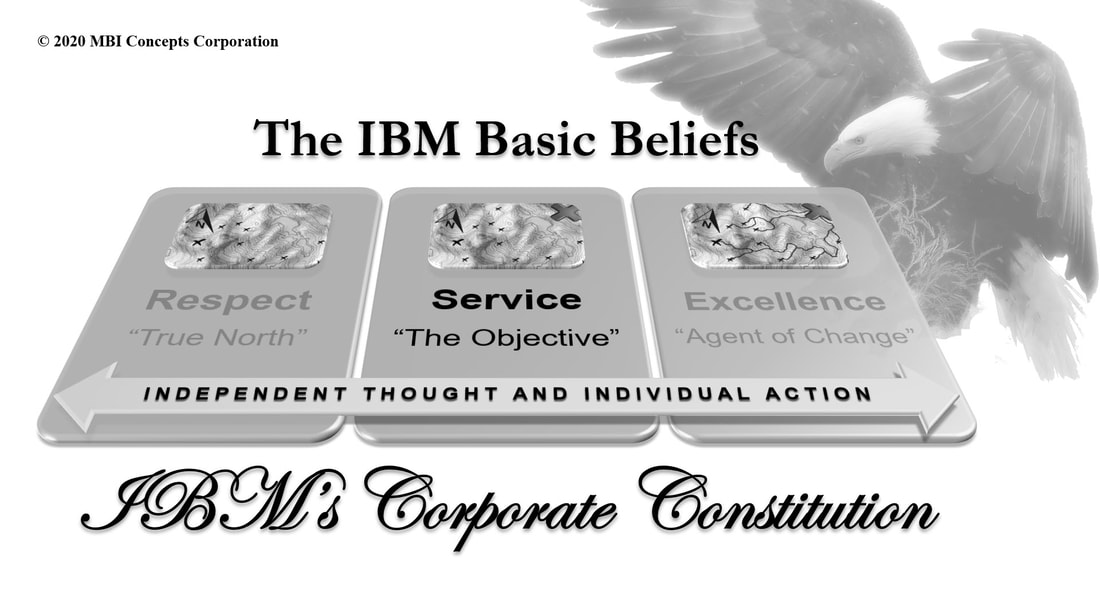We are dedicated to giving our customers the best possible service. Our products and services bring profits only to the degree that they serve the customer and satisfy his needs.
IBM's Basic Belief: Service to the Customer
|
|
Date Published: August 4, 2021
Date Modified: February 17, 2024 |
In 1917, B. C. Forbes published Men Who Are Making America. He asked businessmen all over the country, “Who are our fifty foremost businessmen?” From the list he culled the top fifty and set out to discover who these men were.
He found from his inquiry that these individuals succeeded in a land of liberty where “neither birth nor education, nationality nor religion, heredity nor environment were barriers—or passports—to success.” He discovered that “worth alone counts” and that the “only caste in America is merit.” After conducting his interviews he summarized his findings with this: “Success is coming to be spelled Service. Providence would seem to have ordained that the man who serves most shall reap most. The success that consists only of dollars is no longer accounted worthwhile success.”
I am sure that Watson Sr., traditional founder of IBM, sitting at the time in the corner office of the C-T-R Company, nodded in agreement. He already knew that his corporation was and would continue to be in good company. Thirty years later, as service reigned supreme, his face and his “The IBM” graced the pages of the next edition of B. C. Forbes’ book: America’s Fifty Foremost Business Leaders.
Later, Watson Jr. pegged service in The Basic Beliefs as: “Service to the Customer.” But when a whole company believes that “IBM Means Service,” that attitude spilled out into every critical business relationship with customers, business partners, employees, shareholders and into their shared societies.
Service, once it is released, cannot be restrained.
He found from his inquiry that these individuals succeeded in a land of liberty where “neither birth nor education, nationality nor religion, heredity nor environment were barriers—or passports—to success.” He discovered that “worth alone counts” and that the “only caste in America is merit.” After conducting his interviews he summarized his findings with this: “Success is coming to be spelled Service. Providence would seem to have ordained that the man who serves most shall reap most. The success that consists only of dollars is no longer accounted worthwhile success.”
I am sure that Watson Sr., traditional founder of IBM, sitting at the time in the corner office of the C-T-R Company, nodded in agreement. He already knew that his corporation was and would continue to be in good company. Thirty years later, as service reigned supreme, his face and his “The IBM” graced the pages of the next edition of B. C. Forbes’ book: America’s Fifty Foremost Business Leaders.
Later, Watson Jr. pegged service in The Basic Beliefs as: “Service to the Customer.” But when a whole company believes that “IBM Means Service,” that attitude spilled out into every critical business relationship with customers, business partners, employees, shareholders and into their shared societies.
Service, once it is released, cannot be restrained.
Service to the Customer Was "The Objective"
We are dedicated to giving our customers the best possible service. Our products and services bring profits only to the degree that they serve the customer and satisfy his needs. This demands that we:
- Know our customers’ needs and help them anticipate future needs.
- Help customers use our products and services in the best possible way.
- Provide superior equipment maintenance and supporting services.
Service as the Objective Empowered First-Line Managers
I remember sitting in an impromptu meeting as an administrator. A customer had called to complain to the sales manager (at the time called a marketing manager) that it was as if three different companies were calling on him. Three IBM sales representatives were fighting over who would sell their product. Three separate proposals had shown up on his desk. The customer's employees were at war with each other.
If I remember correctly they were selling three different technologies to a legal firm in Austin, Texas: IBM Typewriters, IBM Displaywriters, and an IBM 5520 Administrative System. Of course, each wanted 100% of the business. I knew it was going to be a tense meeting as commissions were on the line and these were three strong-willed individuals—salesmen.
The sales manager came into the room, sat down and set the tone for the meeting by saying, “We are going to design the best long-term solution for this customer based on what they need and what we have to offer them to fill that need. After that is done, I will ensure that everyone in this room is compensated fairly, because … as we all know … if we don’t do right by the customer, we will all be looking for work in the near future. … Let me be clear, the next call this customer makes to IBM, I will not be the one in control.”
Yes, there were still arguments. Yes, there were very tense moments. But the tone had been set based on the corporation’s basic belief of Service to the Customer: First and foremost, make the customer successful.
The first-line manager reminded them of their ultimate objective: service, not commissions.
If I remember correctly they were selling three different technologies to a legal firm in Austin, Texas: IBM Typewriters, IBM Displaywriters, and an IBM 5520 Administrative System. Of course, each wanted 100% of the business. I knew it was going to be a tense meeting as commissions were on the line and these were three strong-willed individuals—salesmen.
The sales manager came into the room, sat down and set the tone for the meeting by saying, “We are going to design the best long-term solution for this customer based on what they need and what we have to offer them to fill that need. After that is done, I will ensure that everyone in this room is compensated fairly, because … as we all know … if we don’t do right by the customer, we will all be looking for work in the near future. … Let me be clear, the next call this customer makes to IBM, I will not be the one in control.”
Yes, there were still arguments. Yes, there were very tense moments. But the tone had been set based on the corporation’s basic belief of Service to the Customer: First and foremost, make the customer successful.
The first-line manager reminded them of their ultimate objective: service, not commissions.
Service Underpinned Success
Jim Collins wrote in Built to Last that visionary companies treat profit like “oxygen, food, water, and blood for the body; they are not the point of life, but without them, there is no life.” In a capitalistic system, profits are a necessity: profits improve products, pay dividends, print paychecks, provide benefits, and safeguard social stability.
How a corporation goes about achieving these profits is a critical corner office decision.
This principle of service took root early in IBM history:
How a corporation goes about achieving these profits is a critical corner office decision.
This principle of service took root early in IBM history:
There is something in business bigger than the dollar. … A legitimate business must be of real service to the public and promote economic progress. Only when a man feels that he is working for the general good as well as for his own can he do his best.
Thomas J. Watson Sr., IBM Sales Meeting, July 10,1919
Even in 1919, IBM was a "visionary company."
Service was the point—the objective.
Service was the point—the objective.
Roam Around the IBM Wild Duck Information with the Links Below
or [Return to the Wild Ducks Home Page]
or [Return to the Wild Ducks Home Page]

